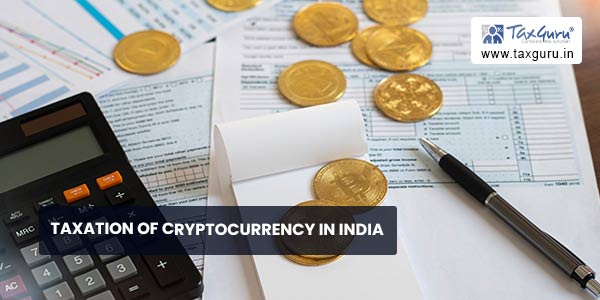Cryptocurrency and Income Tax
Clarification on the taxation of cryptocurrency in India was highly awaited for the crypto holders. With the introduction of Budget 2022, the government has announced taxation norms on the same. Key pointers regarding income tax implications on cryptocurrencies in India are as follows –
1. Cryptocurrency – Meaning as per Income Tax provisions
- a form of virtual digital asset
- not being an Indian currency or foreign currency as per the provisions of Foreign Exchange Management Act, 1999
- functions as a store of value, unit of account
- can be transferred, stored or traded electronically
2. Classification of Virtual Digital Asset
As per the Finance Bill, 2022, the cryptocurrencies are classified as a capital asset for the purpose of taxation and hence, income under the head capital gain will arise on transaction of the same.
3. Tax on income from Cryptocurrencies [Section 115BBH]
- Income from transfer of cryptocurrencies will be taxed at the rate of 30%
- Deduction – No deduction of any expenditure except for cost of acquisition will be allowed
- Set off/ Carry forward of losses – No set off of losses against any income is allowed as well as carry forward of losses in this respect is also not allowed
Computation of capital gains on transfer of Cryptocurrencies
| Particulars | Amount (Rs.) |
| Full Value of Consideration | XXXX |
| Less: Cost of Acquisition | (XXXX) |
| Long-term/ Short-term Capital Gains | XXXX |
The following should be ignored while computing capital gains on transfer of cryptocurrencies
i) Cost of improvement relating to the asset
ii) Selling expenses i.e. the expenditure incurred in connection with the transfer of virtual digital asset
iii) Indexation of cost of acquisition
iv) Any exemption under section 54F
Further, no deduction under Chapter VI-A shall be allowed. However, relief under section 87A i.e. rebate can be claimed.
4. Applicability of TDS provisions [Section 194S]
A new section 194S is proposed to be inserted in The Income Tax Act, 1961 w.e.f. 01.07.2022 regarding TDS.
Deductor – Any person responsible for paying any sum by way of consideration for the transfer of cryptocurrency.
Deductee – Tax is required to be deducted if amount is payable to a resident person
Rate of TDS – 1% of consideration
When to deduct – At the time of payment or at the time of credit of such sum to the account of resident, whichever is earlier
Exemption from TDS –
1. If consideration is payable by any person (other than a specified person) and its aggregate value does not exceed Rs. 10,000 during the financial year
2. If consideration is payable by a specified person and its aggregate value does not exceed Rs. 50,000 during the financial year
Meaning of “specified person” –
- An individual or a HUF, whose total sales, gross receipts does not exceed Rs. 1 crore in case of business or Rs. 50 lakh in case of a profession, during the financial year immediately preceding the financial year in which such virtual digital asset is transferred
- An individual or a HUF who does not have any income under the head profits and gains of business or profession
Cryptocurrency and GST (Goods and Services Tax)
The matter of taxability of cryptocurrencies under The Goods and Services Act is yet to be addressed by the government.
Let’s go into its classification under GST –
If Cryptocurrencies are to be classified as “money” under the purview of GST?
On perusal of its features i.e., store of value, unit of account etc., it seems to be money. However, as per the provisions of CGST Act, 2017 “money” means legal tender or foreign currency recognized by RBI and hence, it will not be regarded as money, as the same does not fulfil such conditions.
If Cryptocurrencies are to be classified as “Securities” under the purview of GST?
The CGST Act, 2017 defines securities as having the same meaning as assigned to it under The Securities Contracts (Regulation) Act, 1956. On perusal of that definition too, cryptocurrencies are concluded to be fallen outside the meaning of “securities”.
Whether it is a good or service?
On examination of the definition of “goods” as specified in CGST Act, 2017, observation is such that it cannot be classified as “goods” as the same is neither a movable property nor an actionable claim.
Further, “services” are defined in GST as follows – “services” means anything other than goods, money and securities but includes activities relating to the use of money or its conversion by cash or by any other mode, from one form, currency or denomination, to another form, currency or denomination for which a separate consideration is charged;
Explanation––For the removal of doubts, it is hereby clarified that the expression “services” includes facilitating or arranging transactions in securities
The definition of services clearly states that whatever that is not good is a service, so it seems really appropriate to classify cryptocurrencies as “services”.

Hence, there is no clarity even on classification of cryptocurrencies in GST.
Further, provision of services outside India and getting paid in cryptocurrency is not to be classified as export as one of the condition for classification as export according to GST provisions is that “the payment must be received in convertible foreign exchange or in Indian rupees, whenever permitted by the RBI”. Now, since crypto is not a legal tender, hence fails to fulfil this very condition of export. At this, the government may consider such supply of service as domestic supply and may tax it accordingly.
However, as of now no legal clarification is present in this respect. One can only think of possible implications under GST on transactions connected therewith.
About the Author

Author is Amit Jindal, ACA working as Manager Taxation in Neeraj Bhagat & Co. Chartered Accountants, a Chartered Accountancy firm helping foreign companies in setting up business in India and complying with various tax laws applicable to foreign companies while establishing their business in India.





Where to Show income/loss under Crypto Currency?